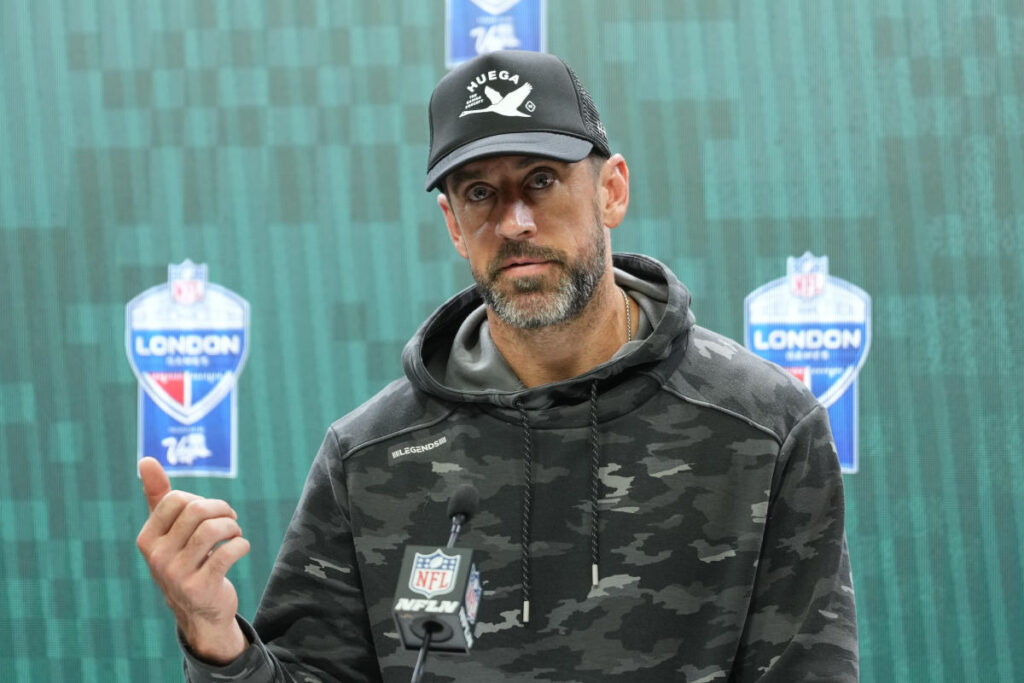Aaron Rodgers recently addressed rumors suggesting that he played a role in the New York Jets’ decision to fire head coach Robert Saleh, labeling the allegations as “ridiculous” during his appearance on The Pat McAfee Show. The four-time NFL MVP expressed his discontent with the accusations, emphasizing their falsehood. He clarified that he does not have the level of influence that some speculate and affirmed his respect for Saleh, stating that the coach was a significant factor in his choice to join the Jets. The comments came on the heels of the Jets’ disappointing performance, which culminated in a 2-3 record following a loss to the Minnesota Vikings, ultimately leading to Saleh’s dismissal.
In the wake of Saleh’s firing, the Jets promoted defensive coordinator Jeff Ulbrich to serve as the interim head coach. Ulbrich, along with team owner Woody Johnson, had discussed potential changes to the coaching staff during a call on Tuesday. Rodgers pointed out that he had a conversation with Johnson the night before Saleh’s firing, describing the discussion as “nothing abnormal.” The timing of these events has led to speculation about Rodgers’ influence within the organization, but he has stood firm in stating that he supported Saleh and did not advocate for his removal.
Acknowledging the struggles of the team’s offensive performance, Rodgers indicated that changes were necessary regardless of Saleh’s status. He cited the team’s inconsistency as a persistent problem and articulated a need for a different approach, echoing the old adage about the definition of insanity. His commitment to finding solutions reflects his broader dedication to team success, regardless of who is at the helm. Moreover, he expressed confidence in his working relationship with Ulbrich, making it clear that he is open to whatever changes are deemed necessary for the betterment of the team.
Rodgers also highlighted the importance of maintaining a strong coaching staff, particularly his long-standing relationship with offensive coordinator Nathaniel Hackett, which dates back to their time together with the Green Bay Packers. The quarterback’s appreciation for their collaborative dynamic further underlines his commitment to elevating the Jets’ offense and ensuring that they are competitive in future games. His remarks suggest optimism about the potential adjustments and the capabilities of the current coaching staff, underscoring that the changes made are meant to foster better performance on the field.
While the Jets navigate this tumultuous period, Rodgers remains a central figure in the franchise’s future. His experience and leadership may prove crucial as he adjusts to Ulbrich’s coaching philosophy and any shifts in the offensive game plan. By vowing to support Ulbrich and the decisions made at the organizational level, Rodgers illustrates a readiness to rally the team and adapt to forthcoming challenges. With the right guidance from the newly appointed interim coach, the Jets’ hopes for a turnaround this season may hinge on how effectively they can implement the necessary changes.
As the team prepares for its next challenges under new leadership, all eyes will be on how both Ulbrich and Rodgers steer the Jets toward regaining their footing. The combination of Rodgers’ veteran presence and Ulbrich’s fresh perspective could create an opportunity for the team to break its recent cycle of inconsistency. With heightened expectations, the Jets will be looking to leverage this transitional phase to reincorporate elements that foster collective improvement and ultimately enhance their standings in the league. This ongoing narrative illustrates the complexities of team dynamics and the critical role that leadership plays in sports, revealing the intricate balance between performance and interrelations within a high-stakes environment.

